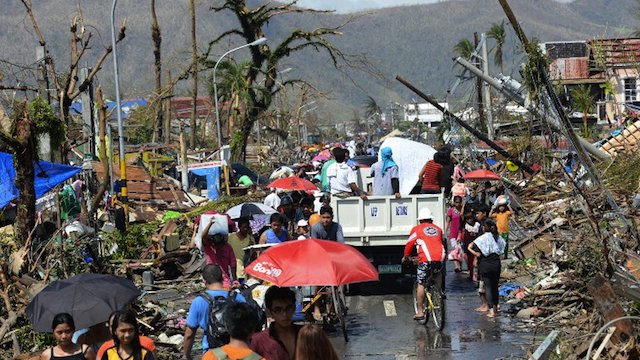SUMMARY
This is AI generated summarization, which may have errors. For context, always refer to the full article.

TACLOBAN CITY, Philippines – The top official of the United Nations (UN) in the Philippines on Saturday, November 23, urged the Philippine government to restore power in typhoon-hit areas within a month.
Luiza Carvalho, UN resident and humanitarian coordinator in the country, said electricity is one of the most important things to show progress in rebuilding.
“I would like to see classrooms not serving as evacuee centers, and able to house, receive their children. I would like to see hospitals fully operational. And most of all, I would like to see electricity established in the whole process, from here to Palawan,” Carvalho told Rappler on Saturday.
Why electricity? Think of the vaccines that need to be stored, the food that has to be preserved, and the women and children whom lights will keep safe.
“Have you been here at night? You spent a night, you see how it is,” Carvalho said. “Imagine if we had lights on. Definitely it gives people hope.” (Watch more in the video below.)
Half a month after Super Typhoon Yolanda (Haiyan) hit the Philippines, darkness covers large parts of Regions IV-B, V, VI, VII, and VIII because of blackouts.
Energy Secretary Jericho Petilla vowed to resign if the government fails to restore power in Yolanda-ravaged areas by Christmas Eve, December 24. (READ: Petilla: I’ll resign if no power by Christmas.)
Daunting work ahead
Restoring electricity is only one of the problems Yolanda inflicted.
The killer typhoon damaged at least P22.47 billion in crops and infrastructure. In Tacloban alone, up to 90% of schools sustained damage after the typhoon. (READ: Yolanda damaged 90% of school infra in Tacloban – Luistro.)
The President had to form a Cabinet-level team to oversee rebuilding. (Watch Rappler’s video report below.)
Asked what struck her the most when she arrived in Tacloban City, Carvalho said, “The work ahead.”
“We have cleaned the roads; this is good,” Carvalho said. “But now we have to go into the hospitals and clean the hospitals, into the schools and clean the schools.”
UN Assistant Secretary General Haoliang Xu, who flew in from New York, said the UN is also focusing on removing debris from typhoon-hit towns and cities.
“We’re still encountering difficulties over equipment,” said Xu, regional director for the Asia-Pacific of the United Nations Development Programme, in an interview with Rappler.
“There are not enough heavy lifting equipment, not enough trucks. So we need to find ways to address these bottlenecks. But what I think is really positive – everybody is working together,” Xu said.
Sustainable rebuilding
Xu said that based on other disasters he has seen, “the key here is that we don’t just give handouts.”
“The biggest question for this disaster, I think, is how do we build back in a sustainable way. Because we know that typhoons will come back,” he said.
The UN official, in any case, has no doubt about Filipino resilience.
Xu said his Filipino colleagues in Tacloban, for example, have worked “non-stop” in relief efforts even if Yolanda also affected them.
“I don’t see people being sad and not doing anything. Everybody’s working to support their fellow Filipinos,” he said. “This is the spirit.” – Rappler.com
Add a comment
How does this make you feel?
There are no comments yet. Add your comment to start the conversation.